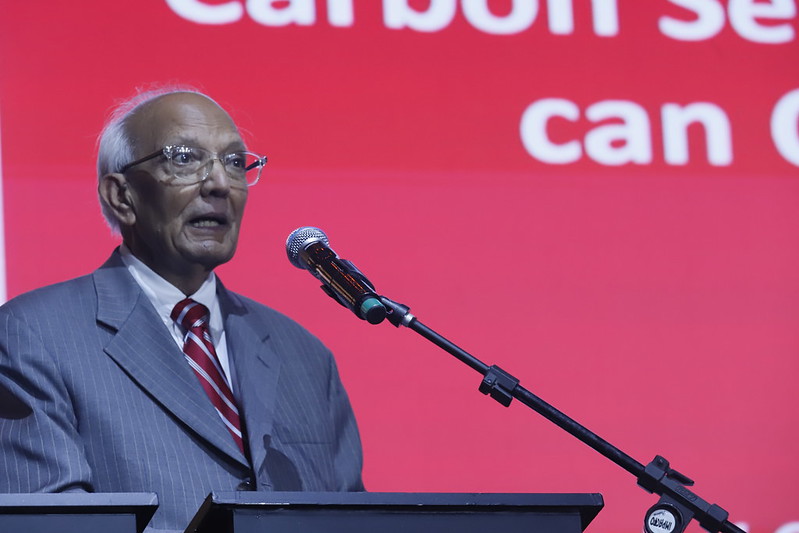 Rattan Lal presenting in Brazil
Rattan Lal presenting in Brazil
Rattan Lal has been a witness to the symbiotic relationship between humans and soil since his childhood. He grew up on his family’s subsistence farm in Punjab, India and saw firsthand how crucial soil health was to those in the community. Lal realized that we all are “the mirror image of the land we live on,” and that we must take great measures to keep our soil healthy.
Committed to giving back to the soil and sharing his research and techniques worldwide, Lal is a Distinguished University Professor of Soil Science with the Ohio State College of Food, Agricultural, and Environmental Sciences. He is a preeminent scientist, who has been recognized with many accolades over his 50-year career, including the Japan Prize, World Food Prize and Padma Shri award, for his contributions to the field.
On August 10, Lal delivered a lecture on the importance of soil sequestration for Brazilian farmers at the 78th Semana Oficial da Engenharia e da Agronomia conference (Official Week of Engineering and Agronomy) in Gramado, Brazil. As one of the world’s largest agricultural producers, Brazil has the ability to create global change to the environment by sequestering carbon in the soil.
Without proper techniques, farming can release lots of carbon into the atmosphere. Rice straw, left over after the harvest of rice in October, is often burned to make way for planting the season’s next crop – wheat. Though this quickly clears the ground to sow wheat, this process is responsible for large carbon emissions.
Lal suggests, instead, for farmers to leave these crops on the ground and allow them to decompose as the wheat grows. This way, the leftover rice straw acts as a natural mulch. Rather than being burned and releasing carbon into the atmosphere, the rice straw will decompose and release nutrients back into the soil to feed the newly planted wheat.
With about 2.3 billion people worldwide suffering from malnutrition, how well we maintain our soils is of incredible importance. To Lal, people can only be as healthy as their soil. His mantra “Healthy Soil = Healthy Food = Healthy People = Healthy Ecosystems = Healthy Planet” has guided his work for years. Soil is more than just dirt; it is the starting point for good health. When soils are stripped of nutrients, it directly affects the food people eat. By keeping crop residue on the land, essential nutrients return to the soil to feed growing plants and, in turn, keep people healthy.
Even those who live in the city can work to promote soil health. Lal suggests that everyone should keep their own garden with herbs and vegetables. Even if there is only room for a box on the windowsill, this is perfect for zucchini or tomato plants. This practice can help children and adults alike to “understand where food comes from,” Lal explained. “They feel healthy soil, worms and that living soil has a lot of life in it.”
“Brazil has been a great success story,” Lal said. With a similar climate to much of Sub-Saharan Africa, Brazil can serve as a role model for farmers across the globe practicing conservation agriculture, which promotes minimum soil disturbance, avoids emissions and sequesters carbon.